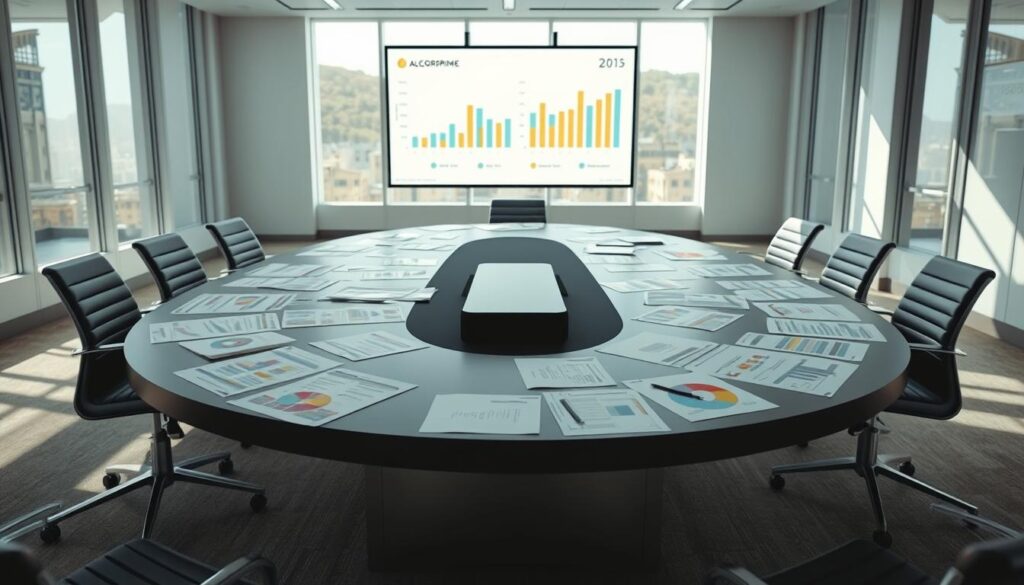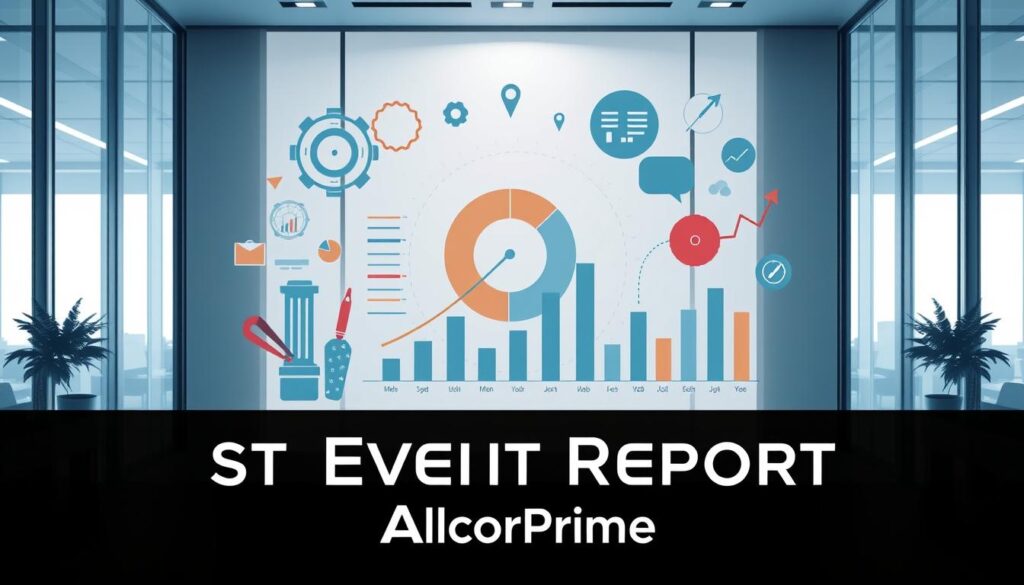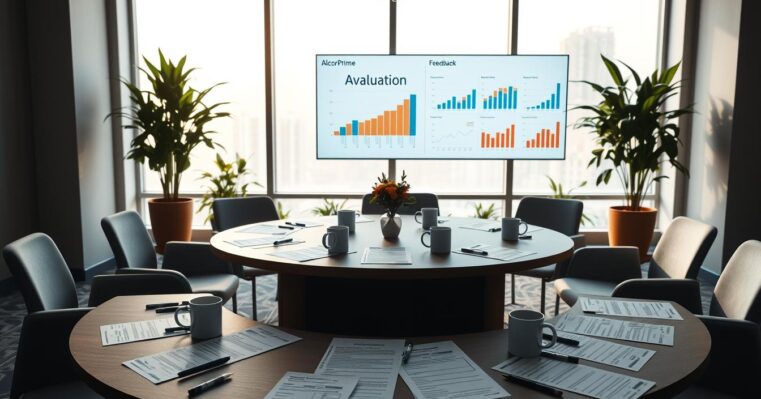Ever wonder what makes an event truly successful? How do we measure its impact? The answer is in post-event evaluation. It's key to checking if an event was a hit and finding ways to get better1. At our company, we know how vital post-event evaluation is. We offer top-notch services to boost your event's impact. Our team will gather and analyze data, giving you insights for better future events.
We aim to give you the best post-event evaluation services. Reach out to us at +62 818 616 006 (WhatsApp) for details. Sources like Global Nexus and Eventbrite say post-event evaluation is key. It helps check if an event hit its mark and spots areas to get better. By doing this, you can make your next event even better, focusing on clear goals12.
Key Takeaways
- Post-event evaluation is essential to evaluate success against established objectives1.
- Collecting feedback from attendees helps gauge satisfaction and identifies areas for improvement1.
- Post-event evaluation assesses whether the event achieved its goals and objectives3.
- Conducting a post-event evaluation allows organizations to improve future events, with a focus on measurable outcomes related to goal achievement2.
- Utilizing surveys can provide quantitative feedback on attendee satisfaction and engagement3.
- Gathering feedback promptly after the event increases the likelihood of accurate recall of event details2.
Understanding post-event evaluation's importance helps you plan successful events. It ensures your goals are met and gives you feedback for future events. This is crucial for analyzing and improving your events132.
What is Post-Event Evaluation?
Assessing an event's success after it ends is crucial. Niraj Davar said that post-event evaluation helps understand an event's true success and what needs to get better4. It looks at the event's goals, how it was done, and the results to see if it was successful. This way, event planners can learn from their event and make better choices for the next one.
The goal of post-event evaluation is to find out what worked well and what didn't. It helps by looking at things like how many people attended, how much money was made, and social media activity5. It also checks how well the event performed and its impact to see if it was a success overall.
Some important parts of post-event evaluation include:
- Getting feedback from people who attended to know what they thought and what could be better
- Looking at the event's money side, like how much was made and spent
- Checking how the event did on social media
By looking at these things, event planners can do a full post-event evaluation. This gives them useful information for planning better events in the future4.
Key Components of Post-Event Evaluation
Post-event evaluation is key to knowing if an event was a success. It looks at more than just how many people showed up. It checks things like how happy people were, how involved they got, and if the event met its goals6. We get feedback from people who attended through surveys, interviews, or social media. We also look at things like how well the event was received, if people learned something new, and if the event helped the brand6.
We look at things like how many people came, how much money was made, and how happy people were. This helps us figure out if the event was a hit7.
When we check how an event did, we look at the budget. We compare what was spent and what was made to see where money was wasted6. We also do a SWOT analysis to find out what worked well, what didn't, and what could be better6. A survey after the event helps us understand what people thought. We look at things like how many people came and how much money was made7.
Our goal is to give a full picture of what makes a good post-event evaluation. This includes how to get feedback, what to measure, and who to involve. We want to help event planners make better choices for their next event.
Some important things to check when looking at event results include:
- How many people came and how much money was made
- How happy people were and how involved they got
- How well the brand was seen and known
- How much money was made back and how well the event met its goals
By looking at these things and using a survey after the event, event planners can really understand what worked and what didn't. This helps them plan better events in the future8.

Tools and Methodologies for Evaluation
We use many tools and methods for a detailed post-event check-up. This includes surveys, data analysis software, and interviews. These help us gather and understand data, giving us insights into event success. With event analysis software, we track things like how many people came and what they downloaded9.
Also, we use feedback tools to hear from attendees. This is key for spotting what needs work and seeing if our events are effective10.
Our evaluation mix includes both numbers and opinions. Surveys give us numbers, like how many showed up. But interviews give us the why behind it all, like what people liked or didn't11. This way, we can spot trends and make better choices for future events. For example, we can see how many sales leads come from events and how much money they bring in9.
Using these tools and methods has many benefits. It helps us plan and run events better. It makes sure attendees have a good time and are engaged. It also helps us see if our events are worth the cost10.
- Improved event planning and execution
- Enhanced attendee experience
- Increased attendee engagement and satisfaction
- Better return on investment (ROI) for event marketing strategies
By using these tools and methods, we get a full picture of our events. This helps us make better choices for future events and grow our business10.
How to Gather Feedback Effectively
We know how key it is to get feedback right to better our events. We must think about when to ask for feedback, what questions to ask, and how to get attendees to share their thoughts. Eventbrite says asking for feedback right away is best, as it gets more responses than waiting12. Quick questions, like yes/no ones, get more answers because they're easy to answer12.
Creating the right questions is important. We should mix open-ended and multiple-choice ones to get good feedback. This mix boosts engagement, with events using real-time tools seeing a 50% jump in interest13. Offering prizes or gadgets can also get more people to share their thoughts12. Live polls can make events more lively, with 70% of planners seeing them as key for better events13.
To get more from attendees, we can use different ways to collect feedback. Feedback walls, live social media, and stations for feedback buttons are good. They help us understand what people think and get them more involved, with 65% of vendors seeing better operations from feedback13. By using these methods, we can get quality feedback and make our events better, leading to happier and more loyal attendees14.
Some important tips for collecting feedback well are:
- Use instant feedback methods to increase response rates
- Craft the right questions to gather valuable insights
- Engage attendees for insight through incentives and interactive methods
- Analyze feedback data to make informed decisions
By following these tips, we can get better at collecting feedback and make our events more enjoyable for everyone.

Analyzing Feedback and Data
We know how key it is to analyze feedback and data after an event. By using data analysis techniques, we can spot trends and patterns. This gives us insights to help plan better events. Global Nexus says finding these trends is key to making smart choices15.
Looking at feedback means we must look at both numbers and words. Numbers tell us facts, while words give us deeper feelings and thoughts. By looking at both, we get a full picture of how our event did. This helps us make better choices for the next time.
Some important tips for good feedback analysis are:
- Keep surveys short and clear
- Use Likert scales for opinions
- Don't force answers to every question
By following these tips and using event data interpretation methods, we can really use our feedback and data. This makes our events even better16.
Communicating Findings to Stakeholders
We know how key it is to share findings well with stakeholders. This includes making a detailed post-event report and using the right communication strategies. Eventbrite says a good report is vital for showing how an event did17.
A good report should have an executive summary, how it was done, and the results. Using visuals and stories makes it easier to share the event's success. Being open and honest is crucial for gaining trust18.
Some important things to think about for talking to stakeholders are:
- Know who you're talking to and what they need
- Choose the best ways to communicate, like email or meetings
- Keep them updated with regular reports
By using these tips, event planners can share their findings well. This helps give valuable insights to stakeholders, making the event better17.

About 70% of stakeholders say feedback after an event is key for planning better next time18. By focusing on talking to stakeholders and making a detailed report, events can be more successful. They meet the audience's needs better.
| Stakeholder Communication Strategies | Benefits |
|---|---|
| Regular updates and progress reports | Enhanced transparency and trust |
| Effective communication channels | Improved engagement and feedback |
| Clear event evaluation presentation | Increased understanding and insight |
Implementing Changes Based on Results
We know that making changes based on results is key for better events. Global Nexus says it's vital to act on feedback and data to improve19. This means looking at what people say and what the numbers show to find ways to get better.
We make a plan with clear steps and deadlines to make sure changes stick20. We also keep checking how things are going to make sure our efforts pay off. This ongoing cycle helps us keep getting better and meet our audience's changing needs.
Important things to think about when making changes include:
- Prioritizing recommendations based on their impact and feasibility
- Building an action plan with specific tasks and timelines
- Monitoring and evaluating progress to ensure that changes are effective and sustainable
By using these strategies, we can make lasting improvements to our events. This leads to better experiences for everyone involved.
Common Post-Event Evaluation Mistakes
We often make mistakes after events that can hurt their success. These errors include missing important metrics, ignoring feedback, and not following up. Eventbrite says missing key metrics is a big mistake, leading to bad analysis21. This can cause poor decisions and ineffective plans for future events.
Some common mistakes to watch out for include:
- Overlooking key metrics, such as attendance numbers or revenue generated
- Ignoring feedback from attendees or stakeholders
- Lack of follow-up, including not implementing changes or not monitoring progress
Knowing these mistakes helps event organizers avoid them and do a good post-event evaluation. Good post-event engagement can keep attendees coming back by up to 20%21. It's important to follow up quickly, within 48 to 72 hours, to keep people engaged21.
Also, having a solid event management plan can help avoid big problems, making up to 70% of successful events22. Adding fun activities and amenities can make attendees happier, increasing their chance of coming back by 40%22. By avoiding these mistakes and using good strategies, event organizers can make their events successful and keep attendees happy.

It's key to focus on post-event evaluation and avoid common mistakes to make future events successful. By doing this, event organizers can create better plans, make attendees happier, and improve the quality of their events. This can be done by doing thorough evaluations, making changes based on feedback, and always checking progress2122.
Best Practices for Post-Event Evaluation
Post-event evaluation is key to knowing if an event was a success and what can be improved. It's important to follow best practices like being consistent, engaging the right people, and using technology. Being consistent helps make sure the evaluation is accurate and reliable, allowing for fair comparisons over time23.
Getting feedback from attendees, stakeholders, and sponsors gives valuable insights. Using technology, like data analysis software and online surveys, makes the process easier and more accurate24. By doing this, event planners can do a thorough and effective evaluation. This leads to better planning for future events and more consistent evaluations.
Some key strategies for post-event evaluation include:
- Using the same metrics and methodology for consistency
- Engaging attendees through surveys and feedback sessions
- Utilizing technology for data analysis and survey distribution
Reports show that 78% of successful event professionals use post-event surveys to plan better for the future23. Also, organizations that analyze their events can see up to a 30% improvement in planning for future events24.
By using these strategies, event planners can improve their evaluation process. This leads to better event planning, more consistent evaluations, and happier attendees2324.
| Best Practice | Description |
|---|---|
| Consistency in Evaluation | Using the same metrics and methodology for evaluation |
| Engaging the Right Audience | Including attendees, stakeholders, and sponsors in the evaluation process |
| Utilizing Technology | Using data analysis software and online survey tools for efficient evaluation |
Success Stories of Effective Evaluations
Successful post-event evaluations can have a big impact, as shown by real-world examples.
A charity gala in Indonesia raised £50,000 for a local cause, beating its goal. It had 200 guests25. The organizers collected feedback and analyzed data. This led to positive comments and understanding of the event's success25.
A conference in Jakarta used live surveys and real-time feedback. This made the event more engaging for attendees26. They also surveyed attendees, volunteers, sponsors, and presenters. This gave a full view of the event's success26.
These stories show how important post-event evaluation is. By learning from these examples, organizers can make future events better. They can improve satisfaction and drive growth26.
The main point is that good evaluations lead to better decisions. They make events more effective and have a lasting positive effect26.
FAQ
What is post-event evaluation?
Post-event evaluation is checking an event after it's over. It looks at the event's goals, how it was done, and the results. This helps figure out if the event was a success.
What is the purpose of post-event evaluation?
It's to find out what worked well and what didn't. This gives insights for better events in the future. It helps event planners understand their event's performance and make better choices for next time.
What are the key components of post-event evaluation?
Key parts include how to get feedback, what to measure, and who to involve. Surveys and interviews give valuable feedback. Metrics like how many people attended and how much money was made show how successful the event was. Getting feedback from sponsors, vendors, and partners is also important.
What tools and methodologies are used for post-event evaluation?
Tools include surveys, data analysis software, and interviews. Surveys and questionnaires help collect feedback in a structured way. Data analysis software helps understand the data. Interviews and focus groups give deeper insights.
How can event organizers gather feedback effectively?
Getting feedback right is key. Ask at the right time, ask the right questions, and make sure attendees feel heard. Asking right away, using a mix of questions, and offering incentives can help get good feedback.
How can event organizers analyze feedback and data effectively?
Analyzing feedback and data is crucial. Look for trends and patterns to understand what happened. Use numbers to get a big picture and words to dive deeper into what people thought and felt.
How can event organizers communicate their findings to stakeholders effectively?
Sharing findings is important. Make a detailed report, use pictures and stories, and be open. This helps keep stakeholders involved and builds trust.
How can event organizers implement changes based on the post-event evaluation results?
Making changes based on feedback is key. Prioritize what needs to change, make a plan, and keep improving. This ensures changes are effective and last over time.
What are some common post-event evaluation mistakes to avoid?
Avoid missing important metrics, ignoring feedback, and not following up. Missing key metrics can lead to wrong conclusions. Ignoring feedback means missing chances to get better. Not following up means not improving.
What are the best practices for conducting effective post-event evaluations?
Best practices include being consistent, talking to the right people, and using technology. Being consistent ensures accurate results. Talking to the right people gives valuable insights. Using technology makes the process easier and more accurate.
Can you provide some success stories of effective post-event evaluations?
Success stories show what works. They come from events like conferences and festivals. They teach lessons and highlight the importance of thorough evaluation. They show how good evaluations can lead to better events.





